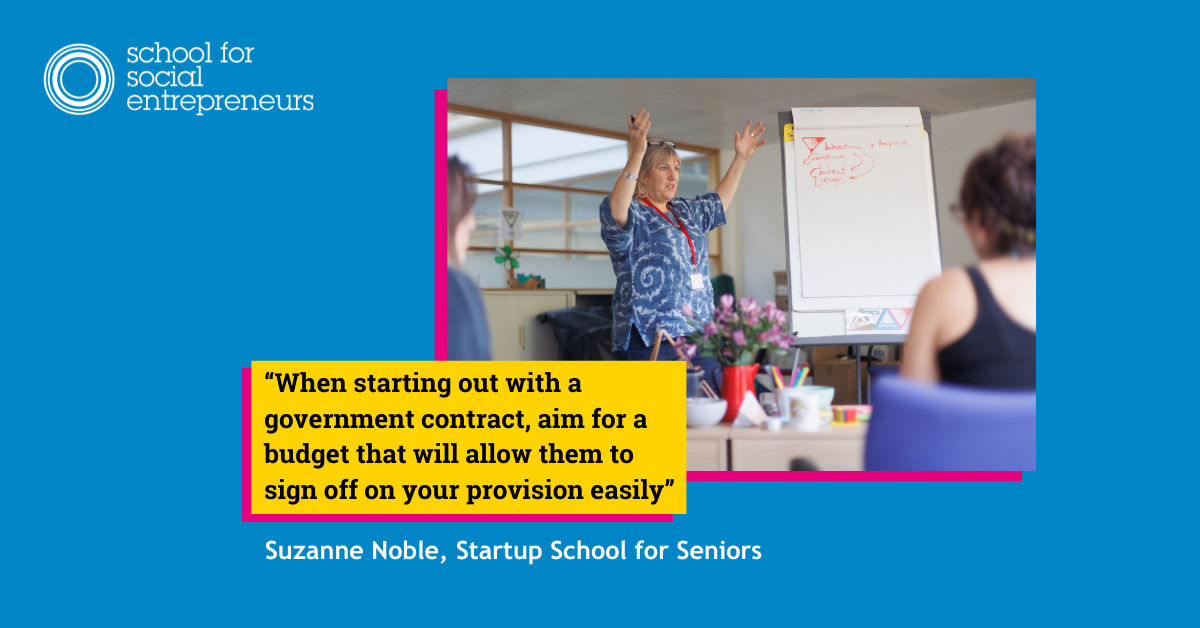Moving from grants to Government contracts
10 Jul 2024
 Written by Suzanne Noble, Co-Founder of Startup School for Seniors.
Written by Suzanne Noble, Co-Founder of Startup School for Seniors.
Every early-stage social enterprise has to start somewhere, and for most of us, that means seeking grants to pilot our ideas and determine if the problem we’re addressing is significant enough for people to pay for.
Once we’ve figured that out, scaling beyond grants and looking for more sustainable income streams is the next challenge. For many organisations, service level agreements (SLAs) from local government may be the answer.
Research their objectives
However, understanding routes to government funding and how they align with your objectives can take time and effort. For example, the social enterprise I co-founded, Startup School for Seniors, which supports those over 50 into self-employment, has been funded through Adult Learning, Economic Development and Employability and Skills departments within local government.
Each of these departments has its own objectives and, as a result, it’s worth reading the strategy documents available online for your own particular local area, the area for which you would like to bid for a contract. This can help you determine a regional need related to your beneficiaries for your service.
| If you’re looking for support for your social enterprise or community business, check out our new Trading for Good programmes. |
Test it out
Having no fundraising experience and being unaware of government contracts, like many early-stage businesses, Startup School for Seniors (an early iteration which was known as Advantages of Age Business Academy) benefitted from early-stage funding from the Paul Hamlyn Foundation, Unltd and SSE’s Trade Up programme.
These early-stage funds allowed our idea to be tested, iterated and discover where the opportunity lie for a programme such as ours, helping people over 50 turn an idea into a business.
There is a logical progression when first starting on the grant funding path, and I suspect we were pretty typical of early-stage businesses in that each grant, from Paul Hamlyn through to SSE’s Trade Up, led to further discoveries, further refining of our provision and greater understanding of what success looks like for our beneficiaries.

Aligning your social enterprise objectives with government priorities
To a particular extent, the government or any other type of funding relies on meeting local or national priorities – for example, tackling homelessness, creating employment opportunities for young people, or working in prisons to prevent reoffending. Understanding how your provision aligns with these needs is fundamental to applying for and successfully obtaining government contracts.
While government contracts have onerous reporting responsibilities compared to grants, they sometimes come with multi-year benefits, which can help ease cash flow issues.
The downside is that government changes can disrupt funding and can only be partially relied upon by some social enterprises.
An opportunity delivered by COVID
When COVID-19 hit and caused a wave of redundancies among individuals over 50, I had already completed the School of Social Entrepreneurs Fellowship program. I gained a deeper understanding of how to help this demographic start their businesses. I realised that an online delivery platform would better serve people with long-term health conditions and those who preferred the flexibility of remote learning.
So, again, I sought grant funding to create the platform, realising COVID-19 presented us with an opportune time to convince a funder of the benefits of online learning. I had wanted to do this since my early days of running the programme in place, but at that time, both government and grant funders wanted only in-place delivery.
Bringing on board business coach and educator Mark Elliott, we reimagined and recreated the programme as a series of video-based modules thanks to a COVID response grant, which we received from the City Bridge Trust in May 2020. With that funding, we developed the website, recorded videos, and launched the platform in October 2020.
Getting our foot in the door
My colleague Mark had a relationship with his local authority, Hammersmith & Fulham, as a business coach and, as a result, he had contacts within their employability and skills department. He saw numerous business owners every week who lacked the basic knowledge needed to make their businesses successful and needed more help than he could provide.
He approached his contact with a low-cost proposal to support local, older residents with startup support through the eight-week course and 1:2:1 mentoring.
Eventually, after multiple meetings, we secured a minor contract with Hammersmith & Fulham, which gave us a foot in the door with a local authority that provided us with proof points for future agreements.
My advice would be, when starting out with a government contract, aim for a budget that will allow them to sign off on your provision easily. This could be, for example, under £5k.
Moving beyond our relationships
For the past two years, we have delivered a monthly webinar we promote via Eventbrite and our database for prospective funders, mainly working in local government. These have helped to give us contracts with relationships, sometimes going back as long as 2022. The sales cycle for any local authority is likely to be quite long.
So, it’s a matter of persistence and scanning the various sites where government contracts are advertised, such as Proactis, sell2wales.gov.wales and others. When bidding, especially if you are unfamiliar with government contract vernacular, getting additional support from companies that specialise in helping social enterprises and charities win bids can be helpful as can taking fundraising workshops.
It’s also a big help to have all your policy documents in a folder related to health & safety, safeguarding, public liability, GDPR, privacy policies, and the other policies government contracts have come to expect as standard.
Challenges and considerations with Local Authority contracts
We are running our 17th cohort of the Startup School for Seniors programme, having delivered it on behalf of multiple local authorities and grants supporting residents in various areas. These include Ealing, Hammersmith & Fulham, Tower Hamlets, Royal Borough of Kensington and Chelsea, and Coventry & Warwickshire, Central Bedfordshire.
Working with local authorities presents fundamental challenges that differ from relying on unrestricted grant funding. There are factors such as outcome-driven requirements, lengthy sales cycles, the need for specific terminologies and policy documents, and the potential impact of political changes on funding availability. It’s essential to navigate these challenges and be flexible in fundraising approaches.
Meeting your targets can be a soul-sucking task if you spend more time reporting than delivering. Ultimately, whatever type of funding you acquire, the consideration must always be on whether the money will contribute towards your organisation’s outcomes and meet the needs of your beneficiaries.
Trading for Good: funded programmes for people who want to improve our world
Gain the knowledge, skills, and confidence to develop and grow projects that tackle social and environmental challenges through strong trading income streams.
Trading for Good provides funding, education and support for social entrepreneurs and community businesses across England. It consists of three programmes aimed at different types of projects at differing stages of their journey.
Each programme has the following specialised support:
- Learning and development programme.
- Match Trading Grant™.
- Ready-made network of people like you.
- Expert insights.
- Peer-to-peer learning.
- Join our community of 3k+ SSE fellows.
